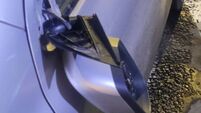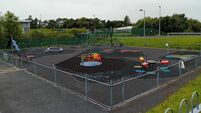East Mayo voters voice wide range of concerns

The old friary in Ballyhaunis after last week's snowfall. Picture: Adam Kaczmarek
Ballyhaunis could in many ways be a microcosm of Irish society as the population goes to vote: there’s plenty of employment locally but not enough housing. An influx of immigrants isn’t new to the town which was long home to the first and only direct provision centre in the county – it was also home to Ireland’s first purpose-built mosque - but in recent years large arrivals of workers to staff the local meat plants has led to a spate of conversions of commercial space into housing for rent.
The hollowing out of town-centre commercial spaces is a major issue at the Parent and Toddlers Group, which meets in the Community Hall on Wednesdays.
“There’s lots of building work going on in Ballyhaunis but it’s all for apartments,” explained one mother. “Lots of places are closing. The hairdresser I went to is closing, it was the only salon catering to younger people. The yoga studio on Clare Street is closing – the owner is moving back to the UK.”
She believes government policy can help revive the town centre.
“From a planning perspective, if you are changing commercial property to residential a certain percentage of the town should be kept for commercial.”
The emptying out of the town’s commercial heart is driving residents’ spending elsewhere, suggested several parents, most of whom preferred not to give their names in order to speak freely.
“To buy pyjamas for my kid I went to Penneys in Castlebar,” said one mother. “I could buy locally but they’d cost a fortune. To do anything you have to leave the town. There are a lot of young families here so there would be a market for more shops.”
When asked if the emergence of online shopping has changed retail to erode the viability of independent retailers -who by necessity of higher costs have to charge more - another parent answered: “I live in the centre of town and would love to buy locally rather than going online.”
The opening of an Aldi discount retail store in the town is definitely a positive, said the parent.
“I used to go to shop at the Aldi in Claremorris but now I can stay here.”
There’s a hum of consensus when one parent contrasts the offerings in Claremorris, less than 18 kilometres south of Ballyhaunis.
“There’s a Tesco in Claremorris and there’s 13 or 14 hair salons there.”
Another mother wants a lower VAT rate for smaller hospitality businesses.
“I have a sister who runs a bar and restaurant in Donegal. The promise by Fine Gael to cut the VAT to 11% seems to be a tactical move: why didn’t they do it in the budget? Towns are going to be ghost towns.
“There’s lots of little grants but no long-term or permanent solutions,” added the parent.
She believes structural issues are driving costs and can’t be cushioned with one-off payments.
“They [businesses] have to pay three more days in sick leave and one more bank holiday. It’s great for employees but there’s nothing at the other end for employers. The new minimum wage is €13.50 but that’s close to the rate paid to a chef so everyone’s wage will have to go up as a result.”

The commercial mix on the town’s streets may be connected to the makeup of the local employment market. Several local retirees who spoke for this article suggested that the town badly needs higher-value employment opportunities that would allow local young people with higher education to stay in the town.
As it stands, a large number of local people drive to work in Harmaq in Castlerea and to medical device makers in Castlebar and Galway while a largely immigrant workforce staffs the town’s two meat plants.
“Ballyhaunis has a lot of low-paid employment with workers who need government supports to be able to afford their rents and subsistence,” explained one retiree. “This means they don’t have spending power to contribute to the local economy.”
Various locals expressed concern that the local primary care centre remains mothballed for over two years, despite a brief visit to the site by the contractor in September.
Public services are as conspicuous by their absence as commercial options, judging by the views at the Parent and Toddlers Group.
“We can’t get a doctor’s appointment so I take the kids to Laya Clinic in Galway where you can just walk in,” explained a young mother with two kids who grew up in the Ballyhaunis area. “You can’t get a doctor in Ballyhaunis.”
Likewise, she said, “there’s no dentist in the town”.
Locals are angry about the non-completion of the local primary healthcare centre.
“Nothing seems to have been done even though work was to have recommenced in September,” said one parent. “We go to the primary care centre in Claremorris.
“I am constantly on the road,” explained the parent of three children. “The swimming lessons are in Castlebar. My daughter plays hockey so I have to go to Tuam with her because that’s the only place with a hockey team. And I take another child to coding workshops in Athenry.
“Unless you play sport it’s limited what you can do in Ballyhaunis.”
Another parent, who moved to the area from South Africa, pointed to a lack of mental health services locally.
“There’s nothing even though a lot of people are coming here with lots of issues if they’re in direct provision.”
The absence of childcare is a major issue for parent Eoin Lynch whose wife can’t go back to work because of the lack of childcare.
“If there was an actual creche in town it would make things a lot easier,” he said. “We’re looking at getting a place next year at the preschool in Hazelhill.”
Eoin supports the return of the current government but also points out what he sees as the inadequacies of local services, the absence of which, he says means “you nearly need to be a three-car household nowadays [to travel to services]”.
“There’s no full-time Garda station, no County Council office, no bank in Ballyhaunis.
“Without the meat plants, there’d be nothing left in town. This town used to have a hotel and niteclubs which are all gone.”
Eoin believes services haven’t kept up with the growth in population locally.
“We’re lucky one of the local doctors agrees to see people even though he is totally oversubscribed, he puts up with it.”
There is also consensus that public order is an issue.
“I wouldn’t go for a walk at night,” said one local woman in her early 30s. “There are a lot of people coming in you don’t know who they are.”
Eoin Lynch feels Ballyhaunis suffers from being a “border town far away” from Castlebar, the county town.
“As regards infrastructure, if you’re not coming from or going to Dublin you’re not a priority. They spent millions on a road connecting Westport to Castlebar but it suits people coming from Dublin to Westport.
“I go to work in Cavan and there’s no main road connecting Mayo, Sligo, Leitrim and Cavan. It’s all secondary roads. They’re all crazy busy, wall-to-wall traffic in the morning.”
Fuel costs are an issue for another Ballyhaunis-based commuter who claims she spends €100 a week on petrol to get to a job in Ballina. Staying on a motoring theme, parent Robert Donovan, from Cloonfad, wants to see a crackdown on speeding on the road connecting Ballyhaunis and Galway.
Robert explained his car was recently written off after he was forced into the ditch between Cloonfad and Dunmore by a young driver (since disqualified from driving) travelling at 150 kilometres per hour.
“Penalties have to be much harsher,” he said. “Cars pass through a 50-kilometre zone at 110 kilometres per hour, we need to see speed bumps installed.”
He believes Ireland is behind the UK in terms of speed monitoring.
“There they have permanent speed cameras as well as vans. There’s more police [in the UK] too.”
After Friday prayers at the local mosque, the issues of Ballyhaunis’ large Muslim community are largely in line with the rest of the population but there are also concerns specific to the community. Mohammed Arshad raised an immigration-related issue that’s a priority for the Pakistani community: visas for spouses.
“Our children have all grown up here and paid taxes here. They get married to partners in Pakistan and wish to bring them here but recently we have had to wait for up to a year for the spousal visa.
"My son works in Westport and wants to bring his wife from Pakistan but we are now waiting for six months for the visa, after the wedding.”
Arshad was part of the original community of Pakistani nationals who moved to Ireland in the late 1970s and in the 1980s to work in the United Meat Packers plant built by businessman Mohammed Sher Rafiq.
Another member of that community, Mohammed Almas is concerned about the lack of transport: specifically, connections connecting Ballyhaunis to Dublin Airport which could compare with the City Link service linking Claremorris, Tuam and other towns to the capital.
“There are more people in Ballyhaunis going to the airport than in other towns but the bus only comes to Claremorris or Tuam,” he said.
Also on a transport theme, Sajid Chaudry wants to see a regular service bringing the town's students to Galway.
“If my kids want to go to college in Galway there are two [Bus Eireann] services to Galway every day but if you go to Castlerea there are private operators too.”
Healthcare is a priority for Mohammed Rahmani, a member of the local Syrian community.
“There is no progress yet on the Ballyhaunis primary healthcare centre, we are really short of doctors and forced to go elsewhere to be seen.”
A popular chef born in Pakistan, Saima Shakil like many others, bemoans hospital waiting lists and the cost of living. It's hard to survive nowadays, she says, but she is more animated by Irish education policy. He believes parents should have more of an input into their child's sex education, especially if they think the child is being introduced to subject matter that is not appropriate for them at a young age.
"We must have an option to take out our kids from these classes. School should tell parents prior to this so that they can opt-out their kids from those classes.”
Housing is a priority for the local imam Luqman Ahmed, who continues to seek a home for his family. Residents from the local international protection centre who have received their papers are struggling to find housing outside of direct provision.
An asylum seeker from Pakistan, he received permission to remain in Ireland after nine years in the asylum process, and three appeals of the decision on his application.
“I have a heart problem and this is why they let me stay, I think,” he explained. “Now I’m staying in Ballyhaunis and working three days a week but finding independent housing is very difficult,” said the man who declined to be named.
Members of the large local Syrian community are also concerned about finding housing for younger generations finishing college.
“My cousin is a professional online gamer, he got married recently but he’s living with his family in Ballyhaunis, he’s looking for a house but the cost of living is at least cheaper than it was for him in Dublin,” explained Ali Cherbatji.
The lack of services and leisure pursuits may sharpen the pressure on politicians canvassing Ballyhaunis at election time: it has also intensified the focus on sports capital projects sought by local clubs. Sue Peake, a stalwart of the local boxing club, has been lobbying for a new clubhouse in Ballyhaunis.
“We are in desperate need of a clubhouse in the town centre. We will be training out in Bekan 20 years in the new year and for 17 of those years, we have been asking Mayo County Council to help us secure a clubhouse.
“They are currently in talks with the Friary with a view to giving us back the old boxing club at the Scout’s den. The trouble with capital funding is that it has to be paid out before it can be drawn down and anything substantial we apply for would require a massive bridging loan.
"The boxing club struggles to accumulate funds because we are so far out of town and not running at maximum membership capacity. If we were in town we would be open five nights a week with varied and staggered classes bringing our revenue through the roof.”
Also seeking a new facility is Ballyhaunis Cricket Club which met recently with local TD Alan Dillon.
“We are still looking for a site,” explained club member Usman Sarwar. “The executive of the club met Alan [Dillon] and asked him for the cricket ground.”
Amenities – the absence of – is the top election concern of Ali Cherbatji when he meets canvassers.
“We still don’t have an astroturf pitch in Ballyhaunis, we travel three nights a week to Knock to use theirs,” said Cherbatji who plays soccer for Ballyhaunis Town FC.
The environment features too in the worries of some local voters. Merrilyn Finn thinks Ireland badly needs to improve its water infrastructure as it seeks to build more houses.
“If you don’t have water infrastructure you can’t be saying you're going to build 30,000 houses per year. The sewage has to go somewhere. Our rivers are badly polluted. We need better water, it’s the basis of life.”
Merrilyn said she’s voting for a Fine Gael candidate who was helpful to her but isn’t swayed by party lines. She finds Sinn Féin “obnoxious” and is worried about the “fragility” of Ireland’s economy due to a tax structure highly dependent on American multinationals. She also thinks the country needs to improve its defense capacity.
Kilkelly-based pensioner Marita Ryan is worried about the cost of living.
“I was out for a shop and bought eight items and it came to nearly €50. The basics of life have all gone up... milk, bread, cereals.”
Marita said she is now apprehensive about refilling her oil tank because it’s now €1,200 for a full fill.
Formerly a Fine Gael supporter and activist, Marita said intends to "spread my vote around” in this election.
"Voting for the top parties is not working," she remarked, adding that the relationship between the bigger parties is “too cosy”.
The cost of living is another issue for the parents watching their children play at the Community Hall.
“Everything is going up in price. Aldi isn’t cheap anymore. I bought some groceries and a couple of Christmas sweaters and it came to €78, I was shocked.”
Many of the issues that surface on a walk around Ballyhaunis may not be unique to the town but the complexity of local issues could well be. It’s a mix that may produce a volatile, fascinating mix of choices at the local polling booths.




